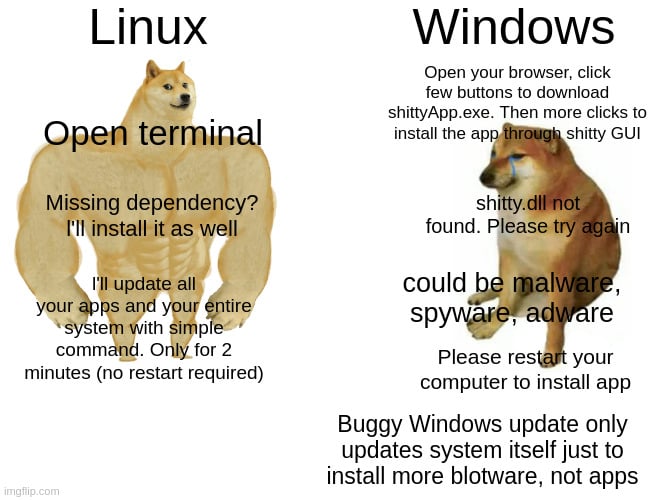this post was submitted on 23 Nov 2024
785 points (89.3% liked)
linuxmemes
21448 readers
816 users here now
Hint: :q!
Sister communities:
Community rules (click to expand)
1. Follow the site-wide rules
- Instance-wide TOS: https://legal.lemmy.world/tos/
- Lemmy code of conduct: https://join-lemmy.org/docs/code_of_conduct.html
2. Be civil
- Understand the difference between a joke and an insult.
- Do not harrass or attack members of the community for any reason.
- Leave remarks of "peasantry" to the PCMR community. If you dislike an OS/service/application, attack the thing you dislike, not the individuals who use it. Some people may not have a choice.
- Bigotry will not be tolerated.
- These rules are somewhat loosened when the subject is a public figure. Still, do not attack their person or incite harrassment.
3. Post Linux-related content
- Including Unix and BSD.
- Non-Linux content is acceptable as long as it makes a reference to Linux. For example, the poorly made mockery of
sudoin Windows. - No porn. Even if you watch it on a Linux machine.
4. No recent reposts
- Everybody uses Arch btw, can't quit Vim, and wants to interject for a moment. You can stop now.
Please report posts and comments that break these rules!
Important: never execute code or follow advice that you don't understand or can't verify, especially here. The word of the day is credibility. This is a meme community -- even the most helpful comments might just be shitposts that can damage your system. Be aware, be smart, don't fork-bomb your computer.
founded 1 year ago
MODERATORS
you are viewing a single comment's thread
view the rest of the comments
view the rest of the comments

No restart require on Linux is a joke, right? Because I get updates that require restarts as often as I get them on Windows when updating Mint.
Unless you're updating the kernel itself, there is little chance you actually need to reboot your machine. Just restarting whatever service or application you're using should do the trick.
Just following the update manager instructions
You do you, it can't hurt to reboot and work on a fresh restart. But if for some reasons you need to keep your machine up, you'll know it is less of a problem than on windows typically
Kde neon made me reboot Everytime it updated. Turns out there was a setting I could disable. Afterwards I was never bugged about rebooting.
Used discover for updates
Maybe you have such a setting?
This is the same on Windows, you can just carry on and then complete an update when you go to shut down the machine. Can't remember the last time an app install or update required the whole OS to be restarted immediately.
I remember what it's called, but at some point there was an app for windows that would check if your machine actually needed a restart or not. Basically the "restart your machine" prompt is mostly just a boilerplate. It's very rare that those installers touch anything that can't actually be loaded without a restart.
Except when it force closes your computer when you dismiss the windows update too many times
I tried installing rust which required some Visual Studio compiler on a Windows machine configured to reset itself when rebooted. It decided I needed a reboot. I'm glad I didn't have unsaved files…
Needless to say I could not run my program on that machine. Why does it need a reboot? I don't know. It's just meant to be a compiler.
And on some distros you can also just reload the kernel without rebooting
Yeah, but you're going to pay for that.
Not necessarily, you can use
kexechttps://wiki.archlinux.org/title/Kexec
Yeah, when you use Arch, you may not pay in money, but you are going to pay, lol.
That's just a doc, kexec is also available on Fedora, Debian, Centos, etc.
Been running endeavouros for over a year on two machines. The only time I couldn't boot was when the Nvidia drivers decided not to work with the LTS kernel anymore. So I just started the normal kernel and changed that to the default in my boot manager. This is the only issue I've had with it and it's arch based. I really don't understand the bad reputation.
Also the arch wiki is applicable to most distros with only slight changes.
Even with kernel updates, you can use something like ksplice or kpatch to update it without rebooting. It's usually only used on servers though.